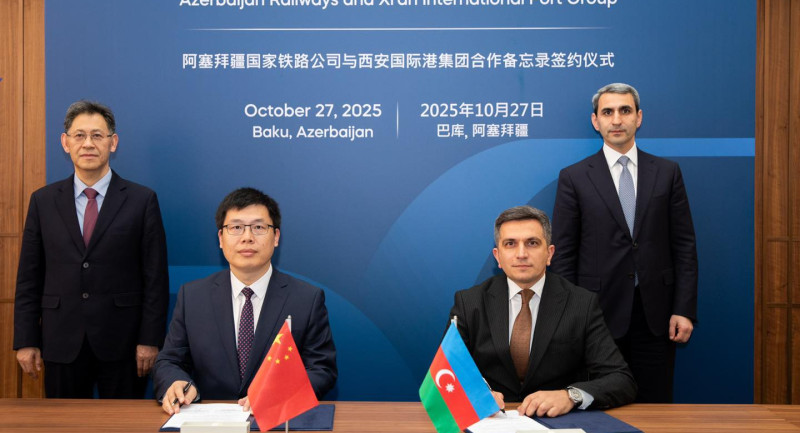Təqribi çatma vaxtı
22 Noyabr 09:28:51

Rovshan Rustamov, Chairman of “Azerbaijan Railways” CJSC (ADY), a company under AZCON Holding, held a meeting with a delegation led by Ye Niuping, Mayor of Xi’an, People’s Republic of China.
During the meeting, it was emphasized that President Ilham Aliyev’s visit to China in April 2025 marked a significant milestone in the development of Azerbaijan–China relations. It was noted that during the visit, the Joint Declaration on establishing comprehensive strategic partnership relations between the two countries, along with the agreements on international multimodal transportation and the joint promotion of the Belt and Road Initiative, laid a strong foundation for further expanding cooperation in the transport and logistics sector.
Satisfaction was expressed with the high level of cooperation between ADY and Chinese transport and logistics companies and ports in the development of the Middle Corridor, and the importance of further strengthening and expanding this cooperation was emphasized.
It was stated that ADY and China’s Xi’an Port are closely cooperating to expand the potential of the Middle Corridor and increase cargo flows along the route. As part of efforts to further develop this cooperation, ADY appointed its representative at Xi’an Port in July, and a container yard with an annual handling capacity of 20,000 TEU was inaugurated. At the same time, ADY representatives were granted access to Xi’an Port’s operational system to facilitate real-time and efficient information exchange.
It was noted that during the first nine months of this year, ADY handled 296 block trains, including 113 transit trains. This figure represents a 39% increase compared to the same period last year. During the same period, a total of 103,134 TEU of containerized cargo was transported, which is approximately 20% higher than the corresponding figure for 2024 (86,413 TEU).
As part of the meeting, a Memorandum of Understanding was signed between “Azerbaijan Railways” CJSC and China’s Xi’an Port.
The document, signed by Arif Agayev, Deputy Chairman of ADY, and Yuan Xiaojun, CEO of Xi’an International Port Group, sets out joint measures to create a favorable environment for international freight transportation, enhance service quality through digitalization, and expand multimodal transport connections along the Middle Corridor within the framework of the Belt and Road Initiative.
By signing the Memorandum of Understanding, the parties agreed to strengthen cooperation in several key areas — including the optimization of container train operations, improvement of cargo transit times, enhancement of the Trans-Caspian International Transport Route (Middle Corridor) capacity, and modernization of railway and port infrastructure along the corridor. The agreement also envisions improving cargo transportation mechanisms across the Caspian Sea, expanding the functionality of the Baku–Tbilisi–Kars railway line and its efficient integration with the railway networks of Türkiye and Europe, developing a sustainable transport development plan along the Middle Corridor, and attracting more transit cargo to increase freight volumes.
It was also agreed to develop and implement an electronic data exchange system to support the real-time monitoring of freight transportation.
The leadership of ADY and Xi’an Port stated their intention to actively explore opportunities for joint investment in logistics infrastructure, implementation of joint construction projects, and the development of shared-use infrastructure models.
In addition, both sides expressed interest in establishing a company either in China or Azerbaijan under a simplified business model to provide highly efficient freight transportation services to customers across the countries along the Middle Corridor.
It should be noted that, although located inland in central China, Xi’an Port serves as a vital gateway for international trade and provides access to seaports for the country’s interior regions. The port is a major hub for railway routes linking western and central China with Central Asia, Europe, and the Middle East. Through Xi’an Port, electronics, textiles, and agricultural products are primarily exported from China’s inland areas to Europe, while energy resources, chemical products, and industrial equipment are imported from Europe and Central Asia.